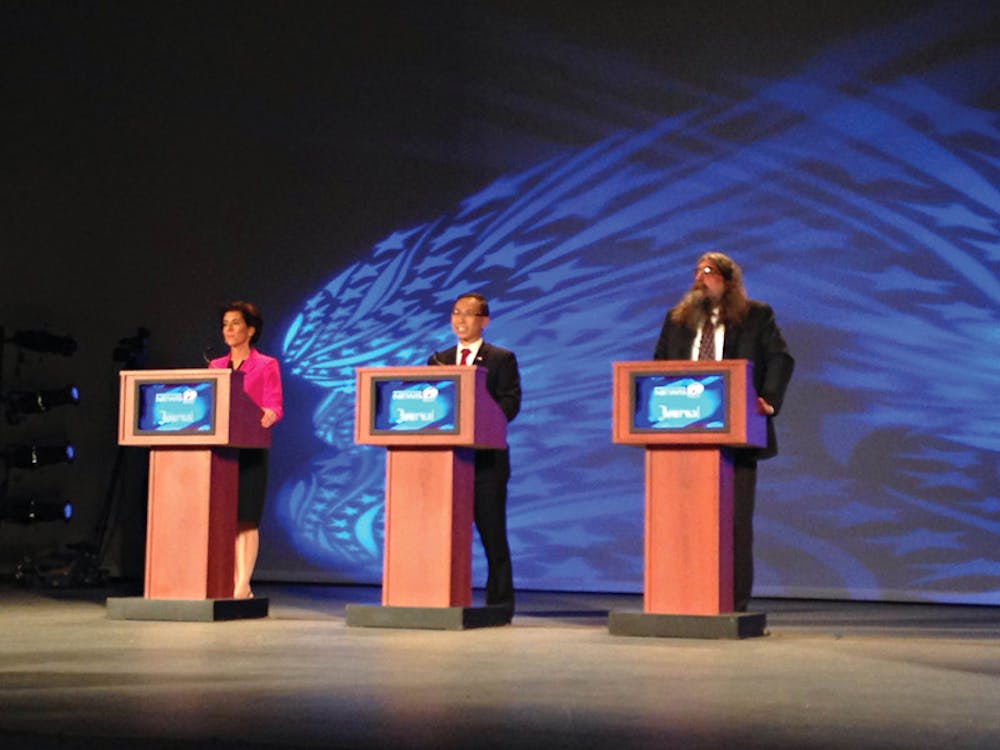Repayment of the 38 Studios loan and reproductive rights dominated discussion Wednesday night at Rhode Island’s first televised gubernatorial debate since the early September primaries. Democratic candidate and General Treasurer Gina Raimondo, Republican candidate and Cranston Mayor Allan Fung and Moderate Party candidate Robert Healey faced off in front of a live audience at the Providence Performing Arts Center.
“Leadership means doing the right thing, even when it’s difficult politics,” Raimondo said about the need to repay bondholders associated with the 38 Studios loan.
Debate over Curt Schilling’s defunct video game company 38 Studios, which declared bankruptcy and defaulted on its $75 million loan from the state in 2012, was a centerpiece of last night’s debate and a central means of attack between the candidates, constituting a quarter of the discussion.
Moderator Tim White, Eyewitness News investigative reporter, addressed Fung first, questioning the use of 38 Studios as a “campaign prop.” White asked Fung whether he was “playing politics with the state’s bond rating.” Fung has publically opposed Raimondo’s desire to repay the 38 Studios bondholders.
Though Fung said he would never play politics with the bond rating, he never directly suggested the state should default on its loan, evading White’s question.
“We have not done our due dilligence in launching a full investigation,” Fung said, adding that, “all the voters in Rhode Island deserve to know the truth before we make any commitment one way or the other.”
While rebutting Fung’s attacks, Raimondo said her position on repaying the bonds stems from the financial necessity. “I don’t want to repay it,” she said, “but we have to repay it, because the experts have told us if we don’t repay it, it’s going to cost twice as much.”
“The bondholders, they’re going to be okay, either way. They have insurance,” Raimondo said. “I care about the people of Rhode Island, and they’re going to be stuck holding the bag.”
Panelist and WPRI reporter Ted Nesi then turned the debate’s attention to Raimondo’s proposed Innovation Institute and the plan’s cost to taxpayers.
The Innovation Institute, a center Raimondo said is “designed to take the great ideas coming out of (the state’s) colleges and universities and turn them into products that we make here” would be funded through a partnership between universities and local businesses and would utilize the empty I-195 land.
“For too long in Rhode Island we’ve been short-sighted,” Raimondo said. “We need to invest in growth.”
Nesi also prompted the candidates to discuss reproductive rights in light of recent backlash from the Catholic community following Raimondo’s Planned Parenthood endorsement.
Despite an endorsement from Rhode Island Right to Life, Fung said he has always identified as pro-choice, “with common sense limitations and restrictions that many Rhode Islanders also support.”
Fung said he supports neither late-term abortions nor partial-birth abortions. “I respect both sides of the issue, and as governor I will not do anything to stand in the way of a woman’s right to make her own health care decisions,” Fung said.
Whereas Raimondo said she respects and accepts the Catholic church’s position in her private life, as governor, she would represent “all the people of Rhode Island, including those who have different religious views” than she does.
The debate moderators engaged Healey during the debate largely as a sidenote with additional input until panelist and Providence Journal political columnist Ed Fitzpatrick asked Healey about a contentious claim in his platform, which Healey recently released to the press.
Fitzpatrick questioned Healey about his “provacative” belief that “the large-scale entry of women into the American workforce has caused (a) detriment to society that may be beyond repair.”
“It sounds misogynist on the surface,” Healey said, but he explained that he believes women’s dilution of the workforce has essentially driven down the cost of labor.
“If you read the document, you would know that it’s clearly not any statement against the woman entering into the workplace. I think they’re far more superior,” he said.
Healey said steps should have been taken to better merge the workforce and prepare for an influx of working women in order to keep labor costs high and keep the parent “best able to take care of the children” at home. Both parents are now forced to enter the workplace in many families, and Rhode Island has risked losing its “homelife.”
Apart from this divisive statement, Healey esentially served as a fourth moderator in a debate dominated by Raimondo and Fung.
“We’re not talking about the future of Rhode Island,” Healey said toward the end of the debate. “We’re bickering between people who have problems with each other over a certain management style.”

ADVERTISEMENT




